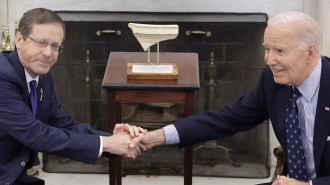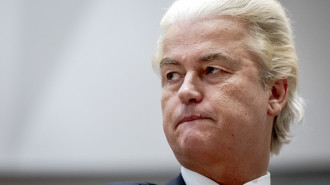Bashir 'plans to step down, form transitional government' to end mass protests in Sudan
Sudan's President Omar al-Bashir has developed a plan to end his rule and form a transitional government in order to quell the mass protests that have swept the country over the past three months, diplomats have said.
Egyptian President Abdel Fattah al-Sisi met with Sudanese Vice President and Defence Minister Awad ibn Auf and National Intelligence Security Services (NISS) chief Salah Gosh and other Sudanese officials in Cairo to discuss the plan last Tuesday, Sudanese and Egyptian diplomatic sources told The New Arab's Arabic service.
"The vision put forward by Bashir is welcomed by Egypt, because Cairo does not want any security disturbances on its southern border," said an Egyptian diplomatic source.
The plan includes assurances that Bashir will not run for president again in elections after constitutional amendments are made, the sources said.
Bashir and other Sudanese regime officials have previously said no new government would be formed until the country's planned 2020 elections. This was in response to protesters' demands that the president step down and allow the formation of a transitional government.
Bashir's plan to stop widespread dissent in Sudan is also said to include steps to prolong the president’s term in power during the transitional period.
Bashir will have been in power for 30 years this year in June, having taken power in a military coup in 1989.
During that transitional period, Sudan would be run by a "presidential council" led by Bashir, including five members representing different Sudanese political parties, one of whom would be Ibn Auf.
The "presidential council" would arrange elections to facilitate a "peaceful transition" from Bashir to his elected successor.
The plan has been agreed upon with opposition forces, armed factions and political parties, the sources claimed.
Ibn Auf and Gosh - who has reportedly been tipped by Egypt, the US, the UAE and Israel as a desired successor to Bashir within the regime - came to Cairo to assure Sisi that the regime's hold on the situation in Sudan was under control, and that the president's meetings with opposition party leaders were going well.
Ibn Auf also reportedly handed a letter from Bashir to his Egyptian counterpart seeking assurances that the Sudanese president would not be subject to International Criminal Court prosecution, an Egyptian diplomatic source said.
Bashir and other regime figures have been indicted by the International Criminal Court (ICC) for war crimes, genocide and crimes against humanity, following massacres in Darfur.
Gosh, who was also director of the much-feared NISS during the conflict, is also widely suspected of being complicit in war crimes in Darfur.
Egypt has been especially supportive of Sudan during the period of protests as the country fears millions of Sudanese fleeing to Egypt if the crisis it to continue, the source added.
The appointment last month of Ibn Auf as vice president and the recent expansion of Gosh's powers under the state of emergency in Sudan have also increased support from Egypt and Sudan's Gulf allies, a Sudanese diplomatic source explained.
While the UAE and Saudi Arabia were reportedly previously keen to topple Bashir in favour of a figure such as Gosh, Egypt had persuaded them to trust Bashir to foster stability in the country, Egyptian diplomatic sources claimed.
The two trusted regime figures also assured Sisi that Bashir's stepping down would not mean "political Islam" coming to power in Sudan. Instead, they told the Egyptian president that the military will continue to retain a firm grasp on power.







 Follow the Middle East's top stories in English at The New Arab on Google News
Follow the Middle East's top stories in English at The New Arab on Google News


